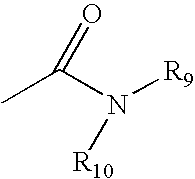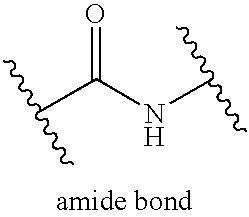Apolipoprotein A1 mimetics and uses thereof
a technology of apolipoprotein and mimetics, applied in the field of apolipoprotein a1 mimetics, can solve the problems of not being clear whether, pharmaceutical agents, and the death of the tissue served by the artery, and not being clear whether
- Summary
- Abstract
- Description
- Claims
- Application Information
AI Technical Summary
Benefits of technology
Problems solved by technology
Method used
Image
Examples
example 1
Synthesis and Purification of a Retro-Inverso Peptidomimetic Rev-D4F
[0092] The retro-inverso peptidomimetic Rev-D4F was synthesized using a standard peptide synthesis method and purified by high performance liquid chromatography.
[0093] To assess the ability of purified Rev-D4F to interact with phospholipids, the purified peptidomimetic was mixed with 1,2-dimyristoyl-sn-glycero-3-phosphocholine (DMPC), which is a component of membrane lipid bi-layer with which cholesterol is associated, and fractionated by gel filtration chromatography. Rev-D4F, similarly to L4F and D4F, associated spontaneously with DMPC efficiently, and all of the peptidomimetic co-eluted with the phospholipid (FIGS. 2B-D). In contrast, only certain portions of intact Apo A-I protein associates with the phospholipid spontaneously (FIG. 2A).
example 2
Effect of Rev-D4F on SR-BI-Dependent Cholesterol Efflux
[0094] The effect of Rev-D4F on the cholesterol efflux in a receptor-manner was examined. Scavenger receptor class B type I (“SR-BI”) is a receptor for HDL normally expressed on the surface of the liver cells. Tritiated cholesterol was added to cells transfected with SR-BI, with wild type Apo A-I, L4F peptide, D4F peptide, or Rev-D4F peptidomimetic, and the percentage of cholesterol efflux was determined.
[0095] When compared to Apo A-I on a per weight basis, L4F, D4F, and Rev-D4F all were more efficient in promoting efflux than Apo A-I protein. When compared on per mole basis, all mimetic peptides were less efficient than Apo A-I protein (see FIGS. 3A and B.
example 3
Effect of Rev-D4F on ABCA1-Dependent Cholesterol Efflux
[0096] The effect of Rev-D4F on the cholesterol efflux in a manner dependent on ATP-binding cassette protein A1 (“ABCA1”) was also examined using the same methodology as for SR-BI, except that ABCA1 was transfected. Similarly to SR-BI-dependent cholesterol efflux, L4F, D4F, and Rev-D4F all were more efficient in promoting cholesterol efflux than Apo A-I on per weight basis. Also similarly to SR-BI-dependent efflux, all three were less efficient than Apo A-I when compared on per mole basis (see FIGS. 4A and B).
PUM
| Property | Measurement | Unit |
|---|---|---|
| Fraction | aaaaa | aaaaa |
Abstract
Description
Claims
Application Information
 Login to View More
Login to View More - R&D
- Intellectual Property
- Life Sciences
- Materials
- Tech Scout
- Unparalleled Data Quality
- Higher Quality Content
- 60% Fewer Hallucinations
Browse by: Latest US Patents, China's latest patents, Technical Efficacy Thesaurus, Application Domain, Technology Topic, Popular Technical Reports.
© 2025 PatSnap. All rights reserved.Legal|Privacy policy|Modern Slavery Act Transparency Statement|Sitemap|About US| Contact US: help@patsnap.com



